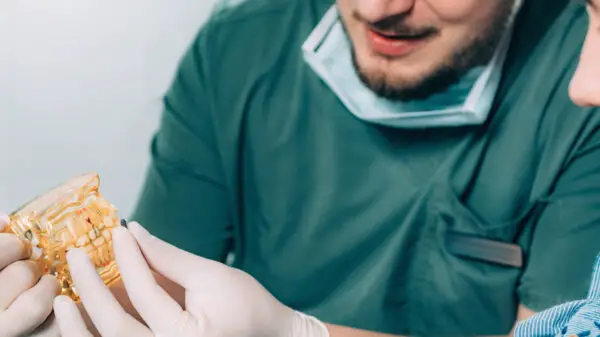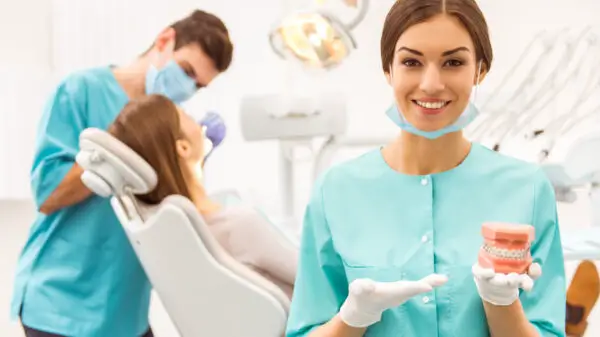What Does It Mean To Be Holistic?
Being holistic means taking a comprehensive, integrated approach to health and wellness. It’s about addressing all aspects of your life—mind, body, spirit, and environment—to achieve balance and harmony. Being holistic goes beyond treating physical symptoms; it focuses on the whole person rather than just one part. So, what is a naturally holistic dentist?
A naturally holistic dentist is a dentist that takes a comprehensive approach to your oral health by integrating the physical and mental aspects of dental care. They also take into consideration the lifestyle and dietary choices that could influence your overall health and not just your mouth.
Holistic approaches to health can include diet and nutrition counseling, exercise and movement therapy, stress management techniques such as yoga or meditation, natural remedies such as herbs or essential oils, spiritual practices such as prayer or visualization exercises, energy healing therapies like Reiki or acupuncture, and lifestyle recommendations for healthier habits.

Whole Body Health
The goal of a holistic approach is to bring balance and harmony to the entire system so that the mind-body connection is strong and healthy. This results in increased energy, a greater sense of well-being, and improved physical health. Holistic approaches also often focus on prevention rather than just treating symptoms when they arise.
Holistic healing does not replace traditional medical treatments but can be used in conjunction with them to achieve better overall health and wellness. It is important to consult with your doctor before making any changes to your lifestyle or diet or engaging in holistic therapies.
Holistic Is Trending
Holistic health has become an increasingly popular trend among people of all ages and backgrounds. This holistic approach to well-being focuses on the whole person, rather than just physical or mental health, to create a healthier lifestyle. Holistic health and holistic doctors take into account the body, mind, emotions, spiritual, and social aspects that make up an individual’s overall well-being.
The holistic approach is gaining in popularity due to its focus on the entire person and its emphasis on preventive care over-reactive treatments. It seeks to identify underlying causes behind illness and disease instead of simply treating symptoms after they appear. By promoting better habits such as diet and exercise as well as stress management techniques like yoga and meditation, it can help prevent or reduce the severity of many medical issues.
Many people are turning to alternative therapies such as acupuncture, massage, and herbal remedies in order to address their health issues. These treatments can be used alone or combined with traditional medicine to create a more holistic approach to healthcare. Holistic practitioners also often focus on lifestyle changes that can have a positive impact on overall well-being such as improving sleep habits, increasing physical activity, and taking time for relaxation and leisure activities.
The popularity of the holistic health trend has been reinforced by celebrities who share their experiences with various holistic treatments on social media. It has also been encouraged by many medical professionals who recognize the importance of looking beyond just physical symptoms and treating the individual as a whole.

Finding A Holistic Community
Finding a holistic health community can be challenging, but it is possible. Holistic health refers to the practice of looking at physical and mental wellness from a broader perspective—rather than simply focusing on treating symptoms or diseases with traditional medicine, holistic health practitioners take into account all aspects of a person’s life to create an individualized plan for overall well-being. It requires more of an investment in terms of time and energy than conventional approaches, which makes it hard to find communities dedicated to this kind of healing.
Search Online
The internet has been a great resource for connecting people interested in holistic health, but there are still challenges in finding reliable information and support online. Finding like-minded individuals who are also trying to lead healthier lifestyles can be difficult. Furthermore, it can be hard to know which sources of information are accurate and unbiased, especially since there are so many conflicting opinions out there.
Network
Finding a holistic health community in person can take more effort but can be immensely rewarding. Look for groups in your local area that offer workshops or classes on topics related to holistic health like yoga, meditation, nutrition, etc. These are great ways to start making connections with other people who have similar interests and goals. Additionally, look into joining exercise groups or support networks at wellness centers or spas focused on natural healing methods such as acupuncture and herbal remedies.
Attending conferences or retreats dedicated to holistic health is another way to meet like-minded individuals. In addition to connecting with other practitioners and experts in the field, attending these events can also be a great way to gain exposure to new healing methods and treatments.
Health-Care
Finally, building relationships with holistic healthcare providers is key to both finding reliable advice and cultivating your own holistic health community. Finding a practitioner or doctor who truly listens to you and takes into account all aspects of your physical and mental health will help ensure that you are receiving the best care possible. With their guidance, you can take an active role in creating a personal support system for yourself by connecting with other individuals who share similar values and interests when it comes to their own well-being.
How Does Holistic Dentistry Work?
A holistic dentist is one who takes a comprehensive approach to your oral health, integrating the physical and mental aspects of dental care. They look at the entire person and not just the mouth, taking into consideration lifestyle and dietary choices that could influence your overall health. A holistic dentist may also consider existing medical conditions that could affect your oral health, such as diabetes or heart problems.
Some things that make a dentist holistic include:
- Taking a whole-person approach to dental care – Holistic dentists consider how nutrition, lifestyle habits, environment, and other factors can affect overall oral health when developing treatment plans for their patients.
- Investing in preventive care – Rather than waiting until there are signs of decay or disease, holistic dentists proactively focus on keeping their patients’ mouths healthy and free of disease, through preventive services such as regular cleanings and check-ups.
- Limiting the use of mercury fillings – Holistic dentists typically avoid placing amalgam (mercury) fillings in their patients and instead opt for composite or porcelain alternatives that are not only safer but also blend in more seamlessly with natural tooth structure.
- Considering alternative treatments – While traditional dentistry still has its place, holistic dentists may be open to exploring more natural forms of treatment such as acupuncture, herbal remedies, and probiotics.
- Practicing biocompatible procedures – Many conventional dental materials contain toxins that can be harmful to the body when used over a long period of time. Holistic dentists carefully select materials that have been proven safe and effective and avoid introducing anything foreign or potentially dangerous into their patients’ bodies.
By understanding how lifestyle choices, medical conditions, and environmental factors can all contribute to oral health, they are better able to provide comprehensive care that is tailored to each individual patient’s needs.

What Questions Should I Ask?
When choosing a holistic dentist, there are a few key questions to ask. Here are some that you should consider:
1. What type of services does the practice offer?
Holistic dentists often provide treatments such as mercury amalgam removal and replacements with biocompatible materials, ozone therapy, homeopathy, and more. Make sure that any treatments offered to you, match your needs and goals.
2. What is the dentist’s experience with treating patients holistically?
Experience matters when it comes to holistic dentistry, so find out how long the practitioner has been offering these types of treatments. Ask what kind of results they have achieved for their patients in specific cases similar to yours.
3. Does the practice use advanced technology in its treatments?
Holistic practitioners often utilize technologies such as lasers, digital imaging, and more. Ask if the practice is up-to-date on the latest trends in holistic dentistry and whether they offer additional services such as nutrition counseling or herbal remedies.
4. Does the practice have a commitment to continuing education?
A good holistic dentist will always be learning new techniques and understanding newer practices in order to keep abreast of changes that may affect treatment outcomes. Ask how many hours are spent each year attending seminars, workshops, and classes related to holistic dentistry.
5. How does the practice manage pain relief for patients?
Many people fear going to the dentist due to fear of pain; but going to the dentist is important. So, make sure you ask about the practice’s methods for helping patients manage pain, including the use of sedation and natural remedies.
Doing the right research and asking the right questions will help you and your dentists make the best decisions for you.
Your Whole Health Is Worth It?
Finding a holistic dentist can be a great choice if you are looking for a dental practice that focuses on the whole person. Holistic dentists take into account all aspects of your health when providing treatments, and they use natural and non-invasive techniques to ensure optimal well-being. They also prioritize preventive care in order to help you avoid dental issues before they become serious. With the right dentist, you can rest easy knowing you and your family are getting comprehensive, quality care.
















